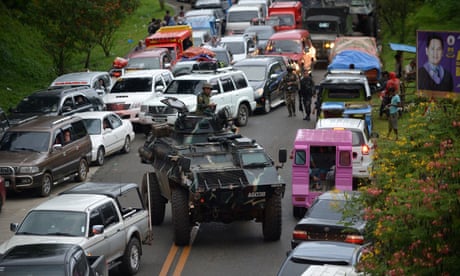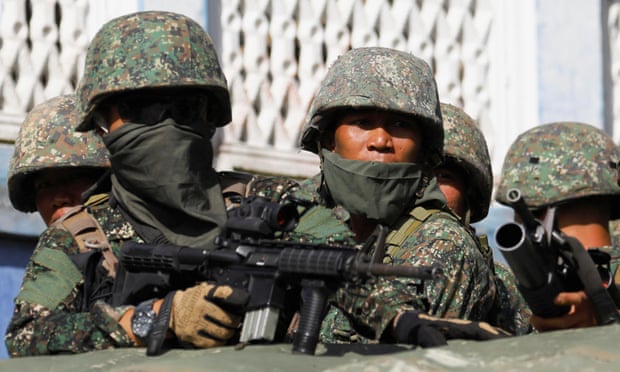From the Philippine Daily Inquirer (May 29): Half of Marawi controlled by rebels? Not true says AFP
The Armed Forces of the Philippines denied reports that half of Marawi City is still controlled by the Maute terrorist group.
“We have complete control of the city, contrary to what is coming out of social media,” Armed Forces of the Philippines (AFP) spokesperson Brig. Gen. Restituto Padilla told Palace reporters.
“It is not true that half of the city is controlled by the rebels. Totally untrue,” he said.
“The Armed Forces and the police are in complete control of the city except for some areas of the city they (Maute group) continue to hold,” he said. “These are the subject of clearing operations that are continually being conducted.”
Padilla said they do not have a timeline for military operations in Marawi but that their “ground commanders have assured them that the end is almost there.”
No exact number of terrorists
However, Padilla said they do not have a number of the remaining rebels in the area.
He described the situation has “very fluid.” He said that while they have received reports that there are around 40 to 50 “armed elements,” the number could go up because of the possibility that some escaped prisoners have joined the group.
“As to the exact number of terrorists remaining, exact figures are not available,” Padilla said.
President Rodrigo Duterte last week declared martial law in Mindanao after the Maute group took over and burned down several establishments, including hospitals and schools. According to Duterte’s report to Congress, the group attacked Marawi City Jail and facilitated the escape of at least 68 inmates.
During the first so-called “Mindanao Hour” briefing in Malacañang on Monday, Presidential Spokesperson Ernesto Abella said 61 terrorists, 19 civilians and 18 government security forces have been killed in Marawi as of Sunday.
Factors in lifting martial law
Asked if the AFP will recommend an extension of martial law, Padilla said it has just started and they have yet to give an assessment on the matter.
“What we are trying to do right now, expedite what needs to be done in order to restore law and order in the whole of Mindanao, particularly in Marawi,” he said.
He said among the factors that they will consider in deciding whether to recommend the lifting of martial law is the restoration of law and order and the absence of “remnants of resistance within the city.”
Padilla said the military will turn over control of the city to civil authorities once the military determines that there is no longer resistance from the terrorists within the city.
He explained that the military currently has full control of the city, which means they have “control (of) who comes in and who comes out, who moves around and who doesn’t.”
http://newsinfo.inquirer.net/900532/half-of-marawi-controlled-by-rebels-not-true-says-afp
What is happening?
Rebels linked to Islamic State have taken control of several neighbourhoods in the southern Philippine city of Marawi, with army artillery and aerial attacks unable to completely dislodge them after six days.
At least 61 militants and 17 security forces have been killed, according to the armed forces. Nineteen civilians have died.
Tens of thousands of people have fled the city of 200,000.
How did the fighting start?
Acting on intelligence, security forces tried to capture Isnilon Hapilon, an Islamist leader endorsed by Islamic State as their point-man for south-east Asia, where jihadists have attempted to establish a presence outside the Middle East.
Hapilon is on the FBI’s most wanted list, with a $5m reward.
Following the botched raid on Tuesday, militants protecting Hapilon went on a rampage, seizing a hospital, school and cathedral. They overran a jail and released scores of inmates.
President Rodrigo Duterte has declared martial law across Mindanao, a poverty-stricken province of 22 million that has a deep history of armed insurrection.

'They kill defenceless people': thousands flee Philippine city of Marawi
Three-day battle between army and Isis-linked Maute insurgents for city on island of Mindanao has left at least 46 dead
Who are the gunmen?
The militants are from a little-know group called the Maute, named after two brothers, Omar and Abdullah Maute.
Hapilon previously led another radical faction, the al-Qaida-linked Abu Sayyaf, known for bombings and beheadings of hostages as well as links to the group that carried out the 2002 Bali bombings in Indonesia.
The Philippines military says Hapilon has now joined the Maute, which previously ran as as a criminal organisation but has grown increasingly ideological in its objectives, according to analysts.
The Maute was blamed for last year’s bombing in the president’s home city, Davao, which killed 14 people. And Islamic State’s Amaq news agency last week claimed responsibility for the Marawi assault.
Analysis Isis-backed militants struggle for control in the southern Philippines
The death toll in Marawi city, where martial law has been imposed, stands at 85, with Islamic State claiming responsibility
Why now?
Sidney Jones, the Jakarta-based director of the Institute for Policy Analysis of Conflict, says the fighting represents a coalition of various radical Islamist factions in Mindanao that have a history of armed violence over land, resources and control.
Now, she says, they have formed a coalition against a common enemy.
“Duterte and his government have failed to appreciate that a major change has taken place in Mindanao, and these men aren’t motivated just by clan politics or money. The leaders may have been ‘bandits’ in the past, but now, they’re ideologues,” she said.
“They have been convinced by Isis that the answer to Mindanao’s problems is Islamic law,” she added.
In an October report, Jones predicted the current tumult. Facing losses in Syria and Iraq, Isis have increasingly looked to the Philippines to establish a province or “wilayat” in the region, the report said.
Support for Isis in Mindanao “has facilitated cooperation across clan and ethnic lines, widened the extremist recruitment pool to include computer-savvy university students and opened new international communication and possibly funding channels,” it said.
Many Muslims in the Philippines live in Mindanao, a semi-autonomous province, and Marawi is the most populated city in the self-governing region.
Who are the gunmen?
The militants are from a little-know group called the Maute, named after two brothers, Omar and Abdullah Maute.
Hapilon previously led another radical faction, the al-Qaida-linked Abu Sayyaf, known for bombings and beheadings of hostages as well as links to the group that carried out the 2002 Bali bombings in Indonesia.
The Philippines military says Hapilon has now joined the Maute, which previously ran as as a criminal organisation but has grown increasingly ideological in its objectives, according to analysts.
The Maute was blamed for last year’s bombing in the president’s home city, Davao, which killed 14 people. And Islamic State’s Amaq news agency last week claimed responsibility for the Marawi assault.
Analysis Isis-backed militants struggle for control in the southern Philippines
The death toll in Marawi city, where martial law has been imposed, stands at 85, with Islamic State claiming responsibility
Why now?
Sidney Jones, the Jakarta-based director of the Institute for Policy Analysis of Conflict, says the fighting represents a coalition of various radical Islamist factions in Mindanao that have a history of armed violence over land, resources and control.
Now, she says, they have formed a coalition against a common enemy.
“Duterte and his government have failed to appreciate that a major change has taken place in Mindanao, and these men aren’t motivated just by clan politics or money. The leaders may have been ‘bandits’ in the past, but now, they’re ideologues,” she said.
“They have been convinced by Isis that the answer to Mindanao’s problems is Islamic law,” she added.
In an October report, Jones predicted the current tumult. Facing losses in Syria and Iraq, Isis have increasingly looked to the Philippines to establish a province or “wilayat” in the region, the report said.
Support for Isis in Mindanao “has facilitated cooperation across clan and ethnic lines, widened the extremist recruitment pool to include computer-savvy university students and opened new international communication and possibly funding channels,” it said.
Many Muslims in the Philippines live in Mindanao, a semi-autonomous province, and Marawi is the most populated city in the self-governing region.
What is the government’s plan?
Duterte cut short a visit to Russia when the clashes erupted and has backed a strong military response. “If there’s an open defiance, you will die,” he said on Wednesday. “And if it means many people dying, so be it.”
Duterte, the former mayor from Davao, another city in Mindanao, has seen his year-long presidency characterised by bloodshed, with a “war on drugs” that has left thousands of alleged drug addicts and suspected dealers dead. He has been condemned internationally for supporting vigilantism.
The president has publicly encouraged civilians to kill addicts and said he will not prosecute police for extrajudicial executions.
He has been equally outspoken during the Marawi clashes, reassuring soldiers that he will protect them if they commit abuses during the conflict, including rape.
“If you go down, I go down. But for this martial law and the consequences of martial law and the ramifications of martial law, I and I alone would be responsible, just do your job I will take care of the rest,” Duterte said on Friday, according to a president’s office transcript.
“I’ll imprison you myself,” he said, referring to any soldiers who commit violations, then he joked: “If you had raped three, I will admit it, that’s on me.”
On Sunday, Duterte appealed to other rebel groups in Mindanao, including two Muslim separatist factions and Maoist-led rebels, to join the fight against the Maute, promising them pay and perks, including housing.
There was no immediate reaction from the three groups.
























